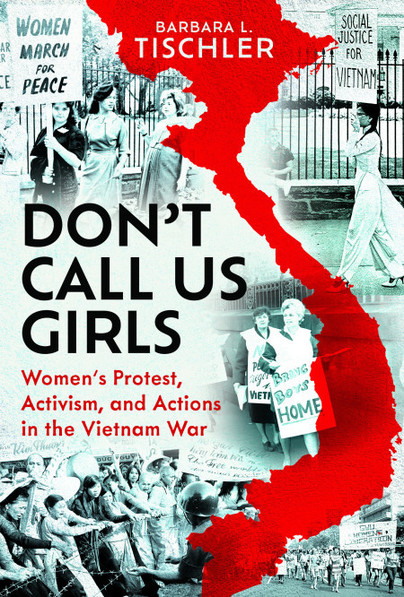Don't Call Us Girls (ePub)
Women’s Activism, Protest and Actions in the Vietnam War
Imprint: Pen & Sword History
File Size: 23.0 MB (.epub)
Pages: 512
ISBN: 9781399066082
Published: 11th November 2024
| Other formats available | Price |
|---|---|
| Don't Call Us Girls Hardback Add to Basket | £25.00 |
Don’t Call Us Girls examines the importance of women’s participation in the Civil Rights Movement in the United States, and the international anti-war movement. This collective voice for peace, and an end to nuclear proliferation, reached back to before the Second World War and then firmly embedded itself during the war years when women assumed such important roles in the workplace that Franklin D. Roosevelt called them the ‘Arsenal of Democracy’.
When the men returned from war, women were encouraged by forces as powerful as government agencies and eminent psychiatrists to return to their ‘place’ at home. And return home they did, only to realize that they could use the skills they practiced as housewives to begin organizing themselves into groups that would start a wave of protest action that swept through the late 1950s, gathering up the Civil Rights Movement as it hurtled ever forward through the next two decades.
In the 1960s and 1970s, no institution or convention was sacred—many aspects of women’s lives were fair game for criticism, protest, and change. In this no-holds-barred era, women debated everything from international nuclear policies, pay equity and child care for women, to reproductive rights and sexual politics. They protested in the streets, outside the White House, in Trafalgar Square, at the Arc de Triomphe, on university campuses, and just about anywhere else they would be heard. They were tired of the role society had cast for them and they would not rest until they saw the substantial change that seemed promising with the emergence of Second Wave Feminism in the 1970s.
While we still live in a patriarchal society, we have these women to thank for many of the freedoms we now enjoy. If they have taught us anything, it is never to stop pushing back against the patriarchy and to rest only when we are truly equal. The final chapter of Don’t Call Us Girls reminds us that there is still a lot of work to do.
Barbara Tischler’s Don’t Call Us Girls Women’s Activism, Protest, and Actions in the Vietnam War, is a lucid, engaging and expansive study. I was delighted to learn so much about a period that I thought I already knew well. I think I am most impressed by the scope of this book. Tischler recounts the story of how women of different classes and ethnicities participated in the Vietnam War, and supported their sons, husbands and brothers whilst other women were central to the success of the anti-war movement. She takes her reader into the detail of the era, but at the same time Tischler’s analysis uses the Vietnam War as a pivot, a vantage point, a fulcrum of activity that enables us to understand interlocking and overlapping aspects of feminism and protest in this momentous period and beyond it. She expertly details the interconnections between Second Wave feminism, the Civil Rights movement, 1968 and student protests in the U.S. and Europe, Gay Rights activism and, reaching into the 21st Century, the Black Lives Matter movement. She attends to the gradual success of feminist activism in arenas such as women’s sports and U.S. college admissions practices and tracks the steady, conservative backlash of legislation like the Equal Rights Amendment and the antecedents of the current conservatism exemplified by Trump and his MAGA base. This is the way to tell history! Tischler is the consummate historian: she has an eye for detail and an ability to bring any context alive on the page. She tells this story with pathos, insight and wit. This is a book I will use in my university literature classes when I teach, for instance, Emily Dickinson’s poetry, Sula by Toni Morrison, Top Girls by Caryl Churchill and Girl, Woman Other by Bernadine Evaristo. Don’t Call Us Girls is relevant to feminist thought in the 19th, 20th and 21st century and will help students and all interested readers to understand the long arc of feminist struggle not just in the U.S. but further afield.
Nicole King
Comprehensive analysis of women’s role in the social movements of the 1960s and 1970s, including the struggle for Civil Rights and against the Vietnam War, leading to “A Movement of One’s Own” to achieve inclusion in society as full citizens. Presenting a diverse range of experiences and perspectives, building on the heroic heritage of women from years past, and introducing us to reformers and innovators whose names may not be well known, but whose activism and actions affected the world in which we live today. Told with a historian’s clear gaze, the transformational changes achieved by this generation are compared to retrenchment in our own time, from liberal progress back to radical conservatism.
David A Fullard, PhD
About Barbara L Tischler
Dr Barbara L Tischler is a cum laude graduate of Douglass College of Rutgers University, where she completed an honours thesis in music, followed by a Master of Music degree in Oboe from the Manhattan School of Music. She worked as a freelance musician in New York City while earning her M.A., M. Phil., and Ph.D. degrees in United States History. Tischler has taught at Columbia University, Barnard College, and Queens College of the City University of New York, among other schools. In 1986, she published An American Music: The Search for an American Musical Identity (Oxford University Press). Rutgers University Press published Sights on the Sixties in 1992, which was part of Tischler’s Perspectives on the Sixties series. She has written numerous articles and book reviews on aspects of social, cultural, women’s, and labour history. In 2015, she published Muhammad Ali: A Man of Many Voices (Routledge). For eight years, she and her husband ran the New York Giants Youth Baseball organization to provide athletic and academic opportunities for talented players. Tischler served as the Head of the Speyer Legacy School from 2015–2019. She has visited schools and participated in seminars on multiculturalism and peace studies in Guatemala, South Africa, and Colombia with Global Connections and with the New York State Association of Independent Schools on a school visit to Finland. Currently a resident of Falls Church, Virginia, Tischler teaches African-American and European history at Empire State University, and she substitute teaches in the Fairfax County Public School System.















